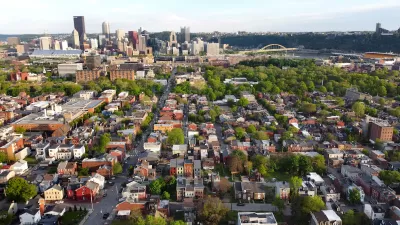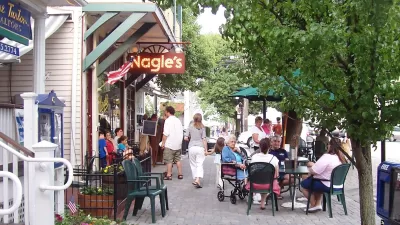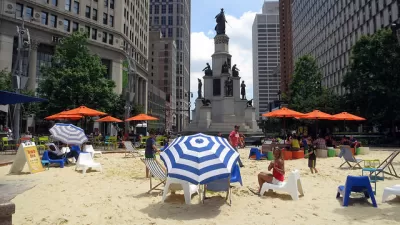To paraphrase B.F. Skinner, if you want positive behavior, either reward it in return, or remove something unpleasant in response; to paraphrase R. Steuteville's commentary, if we want a green economy, we need to do the same thing with development.
"Many new urban projects are built successfully with no public subsidies. But without incentives, the transformation to smart growth takes place much too slowly. Green technologies require a helping hand to compete in the mass market. Industry is heavily invested in current methods, and transition costs are high. Comfort with the status quo and fear of the unknown are barriers to change.
"Smart growth is the green technology of the real estate development industry. Consumers are most familiar with houses on automobile-dependent one-acre lots. One way to encourage more people to try something new is to build a really high-quality public realm loaded with parks and amenities, as planned in Verano [a large green development project SW of San Antonio, TX, supported by tax-increment financing]. This approach costs money. Today's smart growth is not your great grandfather's urban neighborhood - where they laid down a basic grid of streets and let the builders do the rest.
"In most municipalities, builders are strongly discouraged from creating anything but automobile-dependent suburbs. Zoning generally requires dumb growth, and developers are forced either to build sprawl or plead for permission to do something better. Where Verano is planned, officials got rid of that disincentive by approving e SmartCode. The new zoning is, like the TIF, appealing to the developer because as long as the plan meets the SmartCode, public approvals are streamlined.
"Do we want a green America that spends less of our national treasure propping up dictators? We can move in that direction by removing regulatory incentives for sprawl and adopting tax incentives for green development. The development industry will respond with smarter plans that offer residents transportation choice."
Thanks to The Intrepid Staff
FULL STORY: For a green economy, create incentives for smart growth

Alabama: Trump Terminates Settlements for Black Communities Harmed By Raw Sewage
Trump deemed the landmark civil rights agreement “illegal DEI and environmental justice policy.”

Planetizen Federal Action Tracker
A weekly monitor of how Trump’s orders and actions are impacting planners and planning in America.

The 120 Year Old Tiny Home Villages That Sheltered San Francisco’s Earthquake Refugees
More than a century ago, San Francisco mobilized to house thousands of residents displaced by the 1906 earthquake. Could their strategy offer a model for the present?

Ken Jennings Launches Transit Web Series
The Jeopardy champ wants you to ride public transit.

BLM To Rescind Public Lands Rule
The change will downgrade conservation, once again putting federal land at risk for mining and other extractive uses.

Indy Neighborhood Group Builds Temporary Multi-Use Path
Community members, aided in part by funding from the city, repurposed a vehicle lane to create a protected bike and pedestrian path for the summer season.
Urban Design for Planners 1: Software Tools
This six-course series explores essential urban design concepts using open source software and equips planners with the tools they need to participate fully in the urban design process.
Planning for Universal Design
Learn the tools for implementing Universal Design in planning regulations.
Clanton & Associates, Inc.
Jessamine County Fiscal Court
Institute for Housing and Urban Development Studies (IHS)
City of Grandview
Harvard GSD Executive Education
Toledo-Lucas County Plan Commissions
Salt Lake City
NYU Wagner Graduate School of Public Service





























